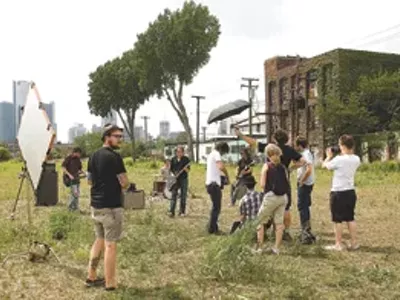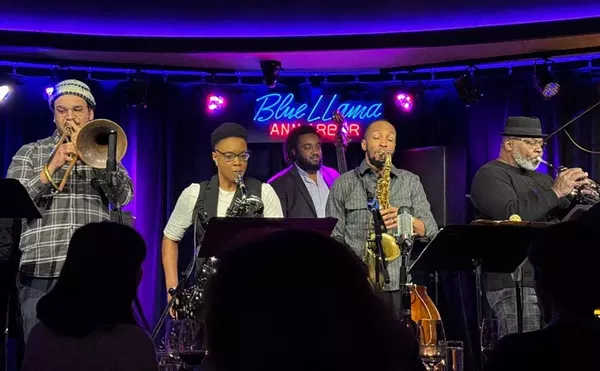A scene out of hip-hop history circa 1996: The venue is the 1,500-capacity House of Blues in Chicago, modeled loosely after a Prague opera house, a joint that's hosted artists from Aretha to the Who. But tonight it's a cavalcade of hip-hop stars. Lauryn Hill of the Fugees is there. De La Soul is there with its trippy, P-Funk-sampling take on rap, plus Cee Lo Green and the ever-positive Common.
A scene out of jazz history the same year: The venue is the 200-capacity Blue Note in New York City. On stage they've got the top names they're known for: Oscar Peterson at the piano, the great Detroit vibraphonist Milt Jackson and the redoubtable Ray Brown on bass. None of the legends shout from the stage: "Put your hands up in the air!" or "Make some noise." The well-received album from that night delivers loving reanimations of the likes of "I Remember Clifford," "Nature Boy" and the Ellington classic "Caravan."
These would seem to be snapshots from different worlds. But jazz and hip hop often aren't as far apart as they may seem. And one of the links is the former Detroiter Karriem Riggins, who played with Common at the aforementioned House of Blues, and, as Ray Brown's regular drummer, was the sole youngster on that all-star Blue Note gig.
In the decade-plus since, Riggins' stature has only grown in both genres, although it's likely that most listeners in either are clueless as to his role in the other. Yet at 34, he's preparing to embark on a recording career as a leader who's poised to make the connection more prominent, and perhaps to help move jazz — if not hip hop — forward in the process.
"I think jazz needs it. It's a progressive movement," Riggins says, of the efforts to bring the musics together. He sees his Karriem Riggins Virtuoso Experience as something more than just a jazz and hip-hop meeting. "This is a fusion of a lot of different genres I listen to, a lot of different music from Brazilian to African to jazz, hip hop, classical, everything."
And while the core of the group is jazz musicians — including pianist Geri Allen — a portion of the show brings in the producer and DJ Pete Rock — a hip-hop legend with an affinity for jazz — with samples and turntables.
"That segment of the show goes from straight-ahead to the straight boom-bap raw element."
Credentialed in jazz at birth, Riggins is a fitting illustration of the 2009 festival theme of "family." His dad is the pianist Emmanuel Riggins, a collaborator with the influential guitarist Grant Green (he's on such discs as Shades of Green and Visions). In fact, the late Green's biographer, Sharony Andrews Green, credits the elder Riggins with convincing Green to leave New York and decamp to Detroit as a base of operations. Emmanuel Riggins, though absent the Detroit scene for some time, continues to play in Ohio.
Karriem says he isn't completely sure why his dad chose Detroit to settle in, but observes, "This is where a lot of hip clubs were, a lot of good musicians. It was just a great time around the late '60s and early '70s."
Of his father, the younger Riggins says, "He wasn't there much, but he left a pile of records, and I studied a lot of records. When he was around, I went to certain rehearsals. It was definitely influential just going to see Marcus Belgrave and Lawrence Williams and all the other bad Detroit musicians."
And Riggins had plenty of teenage peers likewise involved with jazz. Riggins was born in 1975, and, by the late-'80s, jazz was enjoying a new luster, in part coinciding with the ascent of the Marsalis brothers as popular artists and media darlings. Wynton Marsalis, in particular, conducted his own jazz promotion initiative with workshops and other clinics to reach out to young musicians as he toured. "He inspired my generation," Riggins says.
"Rodney Whitaker, Dwight Adams, Khalil and Ali Jackson, Carlos McKinney, Tasili Bond ... there were a lot of cats here," Riggins says, rattling off a very partial list of his Detroit contemporaries who went pro, most of them migrating to New York. Riggins may have been as up on the Fat Boys and other rappers as his Southfield High School contemporaries — he even started making his own beats for hip-hop tracks — it was jazz that dominated his musical imagination.
At 18, Riggins began to work with singer Betty Carter, and shortly after moved to New York just as young, ambitious musicians from across the country were flocking there. "There were so many people my age doing the same thing. And being around that can push you to the next level. It was a beautiful thing," he says.
The young musician worked with numerous bandleaders, names established for decades, like Carter and particularly Ray Brown (for three-plus years), but also with post-Marsalis "young lions" like Roy Hargrove. And he was with Roy Hargrove at a club in 1996 when the rapper Common came by. They hit it off, and as Riggins puts it, "we've been working together ever since."
Riggins is the live-drumming heartbeat that goes with the samples and electronic keyboards of Common's band. More importantly, Common made Riggins a main player in his studio productions and put him touch with the fraternity of hip-hop producers across the country. His credits since then have been stellar, handling beats or productions not only for Common, but for Kanye West, Talib Kweli, the Roots and Erykah Badu, among many others.
Ironically, the Common connection also brought Riggins into the loop of hip-hop artists in his old stomping ground of Detroit, particularly the group Slum Village and Slum Village member J Dilla, who would eventually go solo with Riggins continuing as a major collaborator. And as an ailing Dilla saw himself losing a race to finish his disc The Shining, he gave Riggins the task of seeing the album through to posthumous completion.
Some of the oldest jazz musicians with the biggest ears took an interest in early hip hop. Max Roach performed with rapper Fab Five Freddy in the 1980s. Before his death in 1991, Miles Davis teamed up with Easy Mo Bee on what would be posthumously released as Doo-Bop. More recently, pianist Jason Moran has recorded Afrika Bambaataa "Planet Rock" twice, once a solo piano fantasia. From trumpeter Dave Douglas recording Mary J. Blige to saxophonist Steve Lehman deconstructing the work of Wu Tang Clan's GZA, there are plenty of examples. One of this summer's more talked-about jazz discs is pianist Robert Glasper's Double-Booked. "It's jazz that confidently and rightly assumes new urban black music as part of its basic definition," wrote Ben Ratliff in last Sunday's New York Times.
Hip hop's incorporation of jazz may be more subtle at times, but it's more widespread. In the mid-'90s, Digable Planets hit big with "Cool Like That" and grabbed a Grammy before being terminally pegged as a boho novelty. But some of the greatest names in jazz are subject to the studio splicing and dicing that is one of the main features of hip-hop productions. Samples of Grant Green, Lou Donaldson, Jack McDuff, David Axelrod and Ahmad Jamal flit in and out of tunes by Madonna, Mary J. Blige, Dr. Dre and others. And Riggins, like many of his contemporaries, sees a parallel between the art of sampling in production to the jazz musician's sly quoting of his predecessors in a solo improvisation. (The late Detroiter Lyman Woodard is one of the artists Riggins has sampled into productions.)
The jazz influence comes in from live musicians on hip-hop sessions as well. Take T. Money Green, the bass-playing son of longtime Detroit bassist Will Austin. While he's never considered himself a jazz musician, when he happened in on the ground floor of the gangster rap era at Death Row records, he says, his jazz influences were key.
"I helped invent the gangster rap at Death Row," he says. "You know jazz can be really pretty and upbeat and then sometimes you get those chords that are more minor, more of the abstract type of chord. You know, rappers jump on that. ... It's just dark enough, and, before you know it, the rapper is murdering somebody."
After five years and work on seminal tracks like "Gin and Juice" and the Above the Rim soundtrack, Green split in 1998 and is now back in Detroit.
And of late, the hip-hop embrace of jazz and the old-school R&B mainstream have become more prominent. Consider Queen Latifah's jazz disc, Travelin' Light, for which bassist John Clayton won an arranging Grammy award. Or the news that ?uestlove of the Roots will produce the next Al Green studio sessions.
For his part, Riggins sees a connection that's deeper than samples and overt efforts to span the genres.
"The essence of hip hop is definitely influenced from jazz. It comes from jazz, a lot of the syncopation and the rhythms come from jazz, but it's simpler," he says. "Less is more in hip hop." Yet, he adds, in a sort of Zen-of-hip-hop statement: "There are so many intricacies inside the simplicity."
But can jazz incorporate hip hop in a major way — and can that have a major influence on the jazz audience? Riggins sees more and more hip-hop fans becoming hip to the jazz connection. The name-that-sample game is being played not just by insiders and producers these days.
"Now there are a lot of fans who come up to me at shows, and they'll know exactly what sample I played," he says. And he knows some fans take the next step to, say, "let me learn about Ahmad Jamal and learn about Charlie Parker." And that's a more than anecdotal interest. Last year, Blue Note records thought the interest constituted enough of a market for its release of Droppin' Science: Greatest Samples from the Blue Note Lab.
Bandleader and former Village Voice scribe Greg Tate says the world is still waiting for the grand fusion of jazz and hip hop, someone to do for jazz and hip hop what Miles Davis did with jazz and rock when he started recording Bitches Brew 40 years ago this summer.
The key, Tate says, is that Miles didn't want to hear "half of one thing and half of another, but something he'd never heard before." He convened a session where musicians couldn't really tell — at first, anyway — "if what they played was good, bad or ugly."
The "next bad cat," as he puts it, will be someone who does for the mixture of live music and sampling what "cats like RZA, J Dilla and Tricky did with sampling technology."
Tate says his own band, Burnt Sugar, which uses cutting-edge improv techniques and musicians from jazz, hip hop and elsewhere has been "as hit-or-miss as anyone" on that score. But then, he adds, Burnt Sugar, though ambitious, never set out to create "the ultimate hybrid."
In conversation, Riggins never suggests he's searching for "the ultimate hybrid" either. He's just trying to bring all the music that he's involved with into a whole. He considers all he's learned in hip hop just one element in the brew that he'll bring back home from his current base in L.A. with the Virtuoso Experience. He's also started work on a record with the group, which he expects to complete for release and tour behind next year. Among the reasons for the delay are little things like a high-profile job drumming for Diana Krall's fall tour.
The Virtuoso Experience may not be a game-changing leap forward, but it promises an interesting step or two. And it's a safe bet that Riggins will be an artist to watch on those steps and the ones who follow.
W. Kim Heron is editor of Metro Times. Send comments to [email protected]





